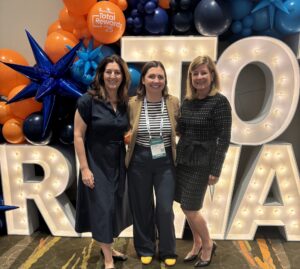This op-ed was written by Canary’s founder and CEO, Rachel Schneider. The piece originally appeared in Fast Company on November 13, 2024.
The founder of Canary says this is a structural problem that can’t be solved with one-off adjustments like tariffs or first-time homebuyer subsidies.
“I can fix the economy.”
“No, it’s my turn.”
“No, you had the last turn.”
“No, I didn’t.”
“Yes, you did.”
“No, I didn’t.”
Economic debate during the recent election cycle was a little like two second-graders arguing about whose gets to go first. Both Republicans and Democrats understood that people are frustrated. They wanted a chance to fix it. But neither of them offered a real solution.
There’s a simple reason: We don’t pay enough attention to the data that explains what’s really happening in people’s financial lives. This is what shows up in economic headlines:
- Unemployment and inflation are down.
- The stock market is up.
- Interest rates may change.
But, we hear a different story at Canary, where we help people with tangible, immediate financial needs access charitable relief. What we hear from them doesn’t show up in those headlines. It’s more like:
- I’m about to be evicted because I can’t afford rent.
- I can’t pay the copay on a recent doctor’s visit and buy groceries.
- I can’t get to work because I can’t afford to fix my car.
In any 90 days, almost half of Americans (46%) experience a financial emergency, according to Lending Club. At that rate, the word emergency doesn’t really make sense anymore. Emergency implies infrequent, surprising, out of the ordinary. But at this volume, it’s the norm, the average—not the extraordinary.
One of the reasons “emergencies” are so frequent is that “between 1990 and 2019, the median family’s income grew 140%, but the cost of childcare grew more than 200%, prescription drugs about 175%, and higher education almost 400%”, according to the Financial Health Network’s recent report, Households Under Financial Pressure.
This doesn’t even factor in the shocking increase in the cost of housing. The mind-boggling expansion in the gap between earnings and the cost of living explains the frequency of “emergencies.” For people to save and invest for the future, they have to be able to earn more than they spend on the basics of supporting a family.
At this point, this is a structural problem in our economy, not one that can be solved with one-off adjustments like tariffs (which will increase prices, making that cushion between earning and spending even harder to attain) or first-time homebuyer subsidies (which solve one slice of the problem for one slice of the population).
Sadly, I don’t have a lot of hope for a systemic, government-led solution in the near term. There are a few things everyone in our very fractured country agrees on. One, we are divided. Two, we are mad about it. Three, it’s someone else’s fault.
The fact that our country is angry, with many of us looking to lay blame, worried me the morning after the election. What if this general fury sets the tone for how businesses do business? I’m sure that plenty of other entrepreneurs had similar worries, especially if they run businesses in the “caring economy.” Anger can get in the way of caring.
Thankfully, I have a lot of hope for local, community-wide solutions guided by caring business leaders. For example, the companies that work with Canary have made a tangible commitment to the economic well-being of their communities. As a result, they hear things like this every day:
- “You probably have no idea how much you have helped my family, but we are finally getting a good night’s sleep.”
- “I am beyond and forever grateful.”
- “I’ve never been with a company with such caring leadership.”
That is what is so powerful about direct action, direct helping. Most of us can’t quiet down the national mood or directly tackle the issues causing it. But, we are each leaders in our own communities and we can strengthen the caring economy.
The U.S. economy isn’t a game to be won or lost in political back-and-forth. The stakes are too high, and the cost is too real for the millions facing financial insecurity daily. Let’s not wait for government to fix a gap that all Americans clearly see and feel. We can choose to build a caring economy that is focused on stabilizing and supporting our communities. For those frustrated by the status quo, it’s our turn. Let’s do something to fix it.
Want to hear more about how organizations can help create a work community that supports each other? Follow Rachel Schneider and Canary on LinkedIn for real-time updates and conversations.
Are you curious how Grant Circle, Canary’s employee relief fund can help build your organization’s empathetic, equitable culture? Let’s chat. You can reach out and book a meeting with our team today.
Not ready to book a call? Watch our quick, on-demand overview of Grant Circle to see if it’s the right fit for your organization.






